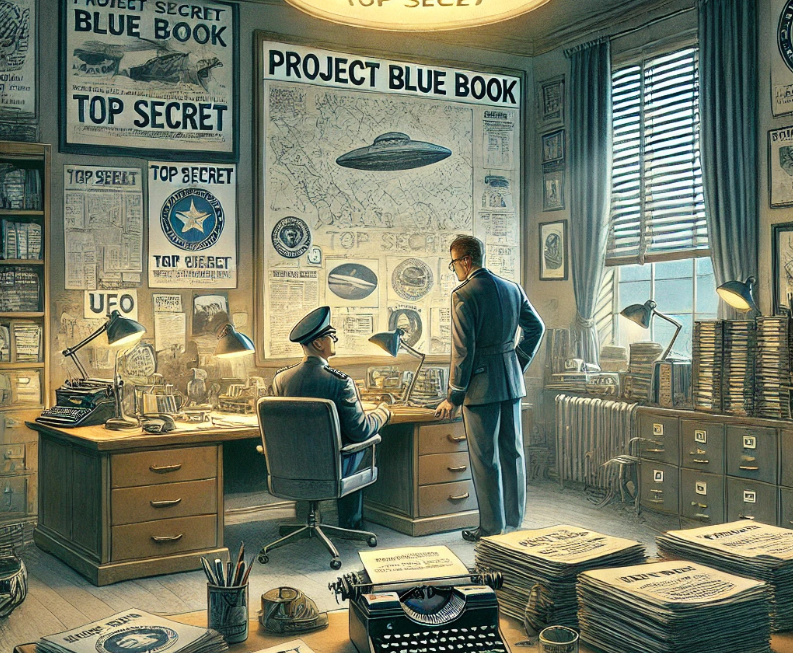Major Jesse Marcel is a name that echoes through the annals of UFO lore, his involvement in the infamous Roswell Incident of 1947 cementing his place in history. As the intelligence officer of the 509th Bomb Group stationed at Roswell Army Air Field, Marcel was at the forefront of what would become one of the most debated and controversial events in the study of UFOs and UAPs. His role in the recovery and subsequent reporting of the wreckage in Roswell has sparked decades of speculation, research, and conspiracy theories, making him a central figure in the ongoing quest to understand the unknown.
BACKGROUND
Jesse A. Marcel was born on May 27, 1907, in Bayou Blue, Louisiana. Before the Roswell Incident brought him into the public eye, Marcel had a distinguished career in the United States military. He was a skilled intelligence officer, highly regarded by his peers and superiors. Marcel’s expertise in radar technology and intelligence made him a trusted figure, which is why he was given the responsibility of handling the mysterious wreckage found near Roswell.
THE ROSWELL INCIDENT: A CLOSE ENCOUNTER WITH HISTORY
The Roswell Incident occurred in July 1947, when a rancher named Mac Brazel discovered debris scattered across a field approximately 75 miles north of Roswell, New Mexico. The wreckage consisted of materials that Brazel could not identify, prompting him to contact the local sheriff. The sheriff, in turn, informed Roswell Army Air Field, and the case quickly escalated to Major Jesse Marcel.
Marcel was dispatched to the site to examine and collect the debris. Upon arrival, he observed materials that were unlike anything he had seen before. The debris included lightweight metals, some of which were described as being incredibly strong yet flexible, and others that exhibited strange properties, such as returning to their original shape after being crumpled. Marcel also reported finding pieces of what appeared to be foil-like material, which was unusually thin and light.
After gathering the materials, Marcel returned to Roswell Army Air Field. His findings led to a press release on July 8, 1947, by the Roswell Army Air Field, announcing that they had recovered a “flying disc.” This announcement quickly gained national attention, but within hours, the story was retracted, and it was claimed that the debris was actually from a weather balloon. This sudden change in the narrative fueled speculation that the military was covering up something far more significant.
MAJOR JESSE MARCEL’S ACCOUNT
Years later, in interviews and public statements, Major Jesse Marcel recounted his experiences during the Roswell Incident. He remained adamant that the debris he recovered was not from a weather balloon, but rather something otherworldly. Marcel’s insistence on the unusual nature of the wreckage played a crucial role in keeping the Roswell story alive in public consciousness.
In a 1979 interview, Marcel stated, “It was not anything from this Earth, that I’m quite sure of… being an intelligence officer, I was familiar with just about all materials used in aircraft and/or air travel. This was nothing like that.” Marcel’s statements reignited interest in the Roswell Incident, leading to renewed investigations and a surge in UFO-related research.
CONTROVERSY AND LEGACY
The controversy surrounding Major Marcel’s account of the Roswell Incident has persisted for decades. Skeptics argue that the debris was indeed part of a classified military project, such as Project Mogul, which involved high-altitude balloons equipped with sensors to detect Soviet nuclear tests. However, proponents of the UFO theory assert that the materials recovered were of extraterrestrial origin, and that the government engaged in a deliberate cover-up to conceal this fact.
Major Jesse Marcel’s legacy is intrinsically tied to the Roswell Incident. He is often regarded as a whistleblower, someone who bravely shared his experiences despite the potential consequences. His account has inspired countless books, documentaries, and even films, ensuring that his story remains a central part of UFO lore.
CONCLUSION
Major Jesse Marcel’s involvement in the Roswell Incident continues to be a subject of fascination and debate. Whether one believes that the debris was extraterrestrial in origin or simply part of a secret military project, there is no denying the impact Marcel has had on the UFO community. His unwavering belief in what he saw and his willingness to speak out have made him a symbol of the pursuit of truth in the face of mystery. Major Jesse Marcel will forever be remembered as the man at the heart of the Roswell Incident, a key figure in one of the most enduring enigmas of the 20th century.



